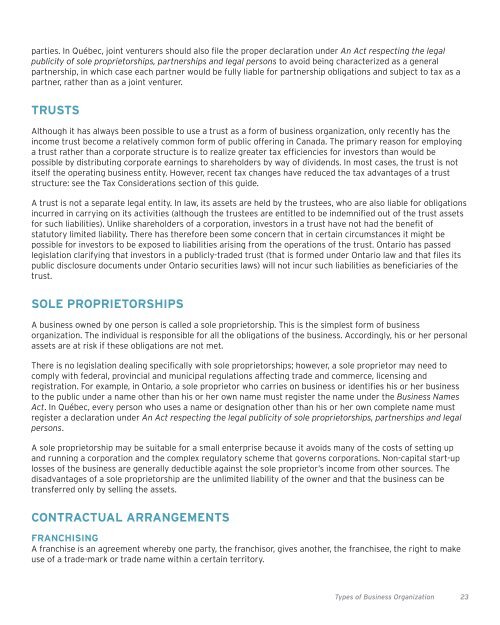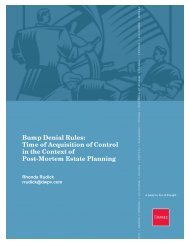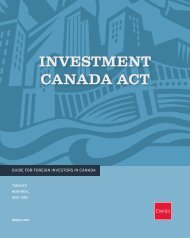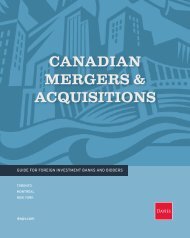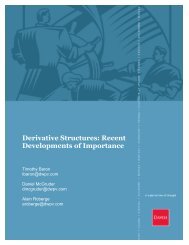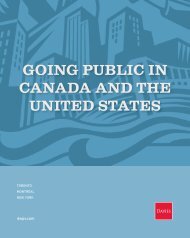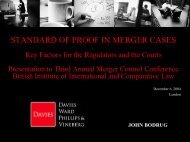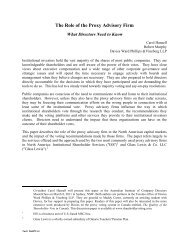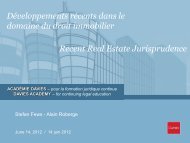To establish a limited partnership <strong>in</strong> Ontario, a declaration signed by the general partners must be filed underthe Limited Partnerships Act. The declaration must be renewed every five years and when the partnershipwishes to cease operations a declaration of dissolution must be filed. The names and contributions of the limitedpartners do not have to be disclosed on the public record.In Québec, a limited partnership must file a declaration every year under An Act respect<strong>in</strong>g the legal publicity ofsole proprietorships, partnerships and legal persons. This declaration must <strong>in</strong>clude, among other <strong>in</strong>formation,the names and addresses of the general and <strong>in</strong>itial limited partners and must specify the partner who isprovid<strong>in</strong>g the largest contribution.UNDECLARED PARTNERSHIPSIn Ontario, although a limited partnership cannot be formed except by the fil<strong>in</strong>g of a declaration under theLimited Partnerships Act, a general partnership may exist without any registration or fil<strong>in</strong>g on the public record(if it uses a firm name or <strong>bus<strong>in</strong>ess</strong> name other than the name of the partners, that name must be registeredunder the Bus<strong>in</strong>ess Names Act, but the failure to do so would not affect the existence of the partnership). If therelationship satisfies the legal criteria for a general partnership, its members will be liable as general partnersfor obligations relat<strong>in</strong>g to the partnership <strong>bus<strong>in</strong>ess</strong> and will be bound by any such obligations <strong>in</strong>curred by any ofthe partners, even to third parties who are not aware of the existence or identity of the other partners. Thisreflects the common law pr<strong>in</strong>ciple that an undisclosed pr<strong>in</strong>cipal will be liable <strong>in</strong> the same manner as a disclosedpr<strong>in</strong>cipal for obligations <strong>in</strong>curred by its agent.In Québec, a general or limited partnership which does not file a declaration under An Act respect<strong>in</strong>g the legalpublicity of sole proprietorships, partnerships and legal persons is an undeclared partnership. An undeclaredpartnership may arise from written or verbal agreement or from overt acts <strong>in</strong>dicat<strong>in</strong>g an <strong>in</strong>tent to form anundeclared partnership. In the absence of an agreement, the relations of partners to each other <strong>in</strong> anundeclared partnership are treated by the provisions of the Civil Code of Québec <strong>in</strong> the same manner as those ofgeneral partners.If a partner of a Québec undeclared partnership contracts <strong>in</strong> his or her own name with a third party who isunaware of the existence of the undeclared partnership, only that partner <strong>in</strong>curs liability to the third party(unlike a general partner, who can b<strong>in</strong>d the other partners). If a third party is aware that a partner of anundeclared partnership is act<strong>in</strong>g <strong>in</strong> a partnership capacity <strong>in</strong> deal<strong>in</strong>g with the third party, however, the otherpartners of the undeclared partnership will also be liable to the third party.JOINT VENTURESA jo<strong>in</strong>t venture is an agreement entered <strong>in</strong>to by two or more parties to pool capital and skills for the purpose ofcarry<strong>in</strong>g out a specific undertak<strong>in</strong>g. It may or may not <strong>in</strong>volve co-ownership by the venturers of the projectassets. Because it is essentially a contractual relationship not specifically regulated by statute, the venturers arefree to agree on whatever terms they choose. S<strong>in</strong>ce a jo<strong>in</strong>t venture is not a recognized entity for tax purposes,<strong>in</strong>come and losses for tax purposes are computed separately by each jo<strong>in</strong>t venturer rather than at the jo<strong>in</strong>tventure level.A jo<strong>in</strong>t venture may be difficult to dist<strong>in</strong>guish from a partnership and the parties’ characterization of theirrelationship may not be conclusive. The most important legal dist<strong>in</strong>ction is that shar<strong>in</strong>g of profits is essential toa partnership, whereas jo<strong>in</strong>t venturers generally contribute to expenses and divide revenues of the project, butdo not calculate profit at the jo<strong>in</strong>t venture level. Equal participation <strong>in</strong> management of the <strong>bus<strong>in</strong>ess</strong> ischaracteristic of a general partnership, but less usual <strong>in</strong> a jo<strong>in</strong>t venture, where one party often operates theproject, or management is contracted out.Jo<strong>in</strong>t venturers who do not want their jo<strong>in</strong>t venture to be treated as a partnership should enter <strong>in</strong>to a writtenagreement sett<strong>in</strong>g out their respective rights and obligations <strong>in</strong> detail and exercise care <strong>in</strong> deal<strong>in</strong>g with third22 Types of Bus<strong>in</strong>ess Organization
parties. In Québec, jo<strong>in</strong>t venturers should also file the proper declaration under An Act respect<strong>in</strong>g the legalpublicity of sole proprietorships, partnerships and legal persons to avoid be<strong>in</strong>g characterized as a generalpartnership, <strong>in</strong> which case each partner would be fully liable for partnership obligations and subject to tax as apartner, rather than as a jo<strong>in</strong>t venturer.TRUSTSAlthough it has always been possible to use a trust as a form of <strong>bus<strong>in</strong>ess</strong> organization, only recently has the<strong>in</strong>come trust become a relatively common form of public offer<strong>in</strong>g <strong>in</strong> Canada. The primary reason for employ<strong>in</strong>ga trust rather than a corporate structure is to realize greater tax efficiencies for <strong>in</strong>vestors than would bepossible by distribut<strong>in</strong>g corporate earn<strong>in</strong>gs to shareholders by way of dividends. In most cases, the trust is notitself the operat<strong>in</strong>g <strong>bus<strong>in</strong>ess</strong> entity. However, recent tax changes have reduced the tax advantages of a truststructure: see the Tax Considerations section of this guide.A trust is not a separate legal entity. In law, its assets are held by the trustees, who are also liable for obligations<strong>in</strong>curred <strong>in</strong> carry<strong>in</strong>g on its activities (although the trustees are entitled to be <strong>in</strong>demnified out of the trust assetsfor such liabilities). Unlike shareholders of a corporation, <strong>in</strong>vestors <strong>in</strong> a trust have not had the benefit ofstatutory limited liability. There has therefore been some concern that <strong>in</strong> certa<strong>in</strong> circumstances it might bepossible for <strong>in</strong>vestors to be exposed to liabilities aris<strong>in</strong>g from the operations of the trust. Ontario has passedlegislation clarify<strong>in</strong>g that <strong>in</strong>vestors <strong>in</strong> a publicly-traded trust (that is formed under Ontario law and that files itspublic disclosure documents under Ontario securities laws) will not <strong>in</strong>cur such liabilities as beneficiaries of thetrust.SOLE PROPRIETORSHIPSA <strong>bus<strong>in</strong>ess</strong> owned by one person is called a sole proprietorship. This is the simplest form of <strong>bus<strong>in</strong>ess</strong>organization. The <strong>in</strong>dividual is responsible for all the obligations of the <strong>bus<strong>in</strong>ess</strong>. Accord<strong>in</strong>gly, his or her personalassets are at risk if these obligations are not met.There is no legislation deal<strong>in</strong>g specifically with sole proprietorships; however, a sole proprietor may need tocomply with federal, prov<strong>in</strong>cial and municipal regulations affect<strong>in</strong>g trade and commerce, licens<strong>in</strong>g andregistration. For example, <strong>in</strong> Ontario, a sole proprietor who carries on <strong>bus<strong>in</strong>ess</strong> or identifies his or her <strong>bus<strong>in</strong>ess</strong>to the public under a name other than his or her own name must register the name under the Bus<strong>in</strong>ess NamesAct. In Québec, every person who uses a name or designation other than his or her own complete name mustregister a declaration under An Act respect<strong>in</strong>g the legal publicity of sole proprietorships, partnerships and legalpersons.A sole proprietorship may be suitable for a small enterprise because it avoids many of the costs of sett<strong>in</strong>g upand runn<strong>in</strong>g a corporation and the complex regulatory scheme that governs corporations. Non-capital start-uplosses of the <strong>bus<strong>in</strong>ess</strong> are generally deductible aga<strong>in</strong>st the sole proprietor’s <strong>in</strong>come from other sources. Thedisadvantages of a sole proprietorship are the unlimited liability of the owner and that the <strong>bus<strong>in</strong>ess</strong> can betransferred only by sell<strong>in</strong>g the assets.CONTRACTUAL ARRANGEMENTSFRANCHISINGA franchise is an agreement whereby one party, the franchisor, gives another, the franchisee, the right to makeuse of a trade-mark or trade name with<strong>in</strong> a certa<strong>in</strong> territory.Types of Bus<strong>in</strong>ess Organization 23
- Page 1 and 2: DOING BUSINESSIN CANADAYOUR COMPLET
- Page 3 and 4: ONTENTSTABLE OF CONTENTSINTRODUCTIO
- Page 5 and 6: IntroductionPOLITICAL AND CONSTITUT
- Page 7 and 8: 5RealEstateIndustrial and Intellect
- Page 9 and 10: accordance with directions from the
- Page 11 and 12: TITLE INSURANCE, TITLE OPINIONS AND
- Page 13 and 14: 11EnvironmentalLawIndustrial and In
- Page 15 and 16: commercial activities, or carrying
- Page 17 and 18: The federal government currently re
- Page 19 and 20: 17Types ofBusiness OrganizationIndu
- Page 21 and 22: provincial law cannot do so as of r
- Page 23: partnership, limited partners’ li
- Page 27 and 28: 25Financing aBusiness OperationIndu
- Page 29 and 30: The Civil Code of Québec provides
- Page 31 and 32: 29CorporateGovernanceIndustrial and
- Page 33 and 34: Instrument 58-101. The practices re
- Page 35 and 36: 33CompetitionLawIndustrial and Inte
- Page 37 and 38: BID-RIGGINGBid rigging is any agree
- Page 39 and 40: anticompetitive agreements among co
- Page 41 and 42: 39ForeignInvestmentIndustrial and I
- Page 43 and 44: apply for Canadian citizenship. (Pe
- Page 45 and 46: (D)GENERAL REVIEW THRESHOLDSThe fol
- Page 47 and 48: there be an "acquisition of control
- Page 49 and 50: Industrial and Intellectual Propert
- Page 51 and 52: to perform or cause them to be perf
- Page 53 and 54: Registration grants an exclusive ri
- Page 55 and 56: PIPEDA applies in all provinces of
- Page 57 and 58: Employment LawCanadian employment l
- Page 59 and 60: displacement, laying-off, suspensio
- Page 61 and 62: easonable cause to believe that the
- Page 63 and 64: 63Retirement Plans, EmployeeBenefit
- Page 65 and 66: • funding;• eligibility;• pen
- Page 67 and 68: 67Temporary Entry andPermanent Resi
- Page 69 and 70: INTERNATIONAL AGREEMENTSIn recent y
- Page 71 and 72: immigrant in another class, he or s
- Page 73 and 74: 73Bankruptcy andInsolvency Proceedi
- Page 75 and 76:
BANKRUPTCYBankruptcy results in the
- Page 77 and 78:
INTERNATIONAL BANKRUPTCYASSETS LOCA
- Page 79 and 80:
Tax ConsiderationsThis chapter prov
- Page 81 and 82:
TAX REPORTINGAnnual Tax ReturnsCana
- Page 83 and 84:
Québec has legislation that limits
- Page 85 and 86:
Amendments, SIFTs and their unithol
- Page 87 and 88:
Conversely, where a Canadian reside
- Page 89 and 90:
A person, whether resident in Canad
- Page 91 and 92:
APPENDIX I: CANADA’S IN FORCE TAX
- Page 93:
TORONTODAVIES WARD PHILLIPS & VINEB


